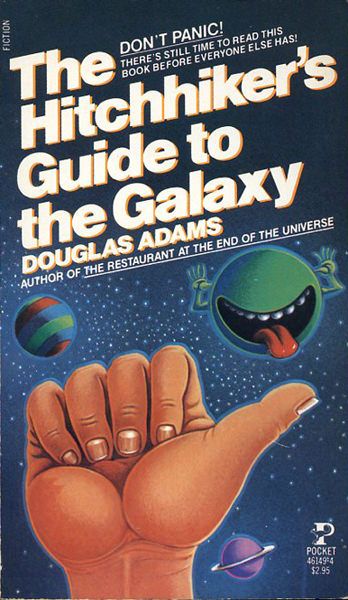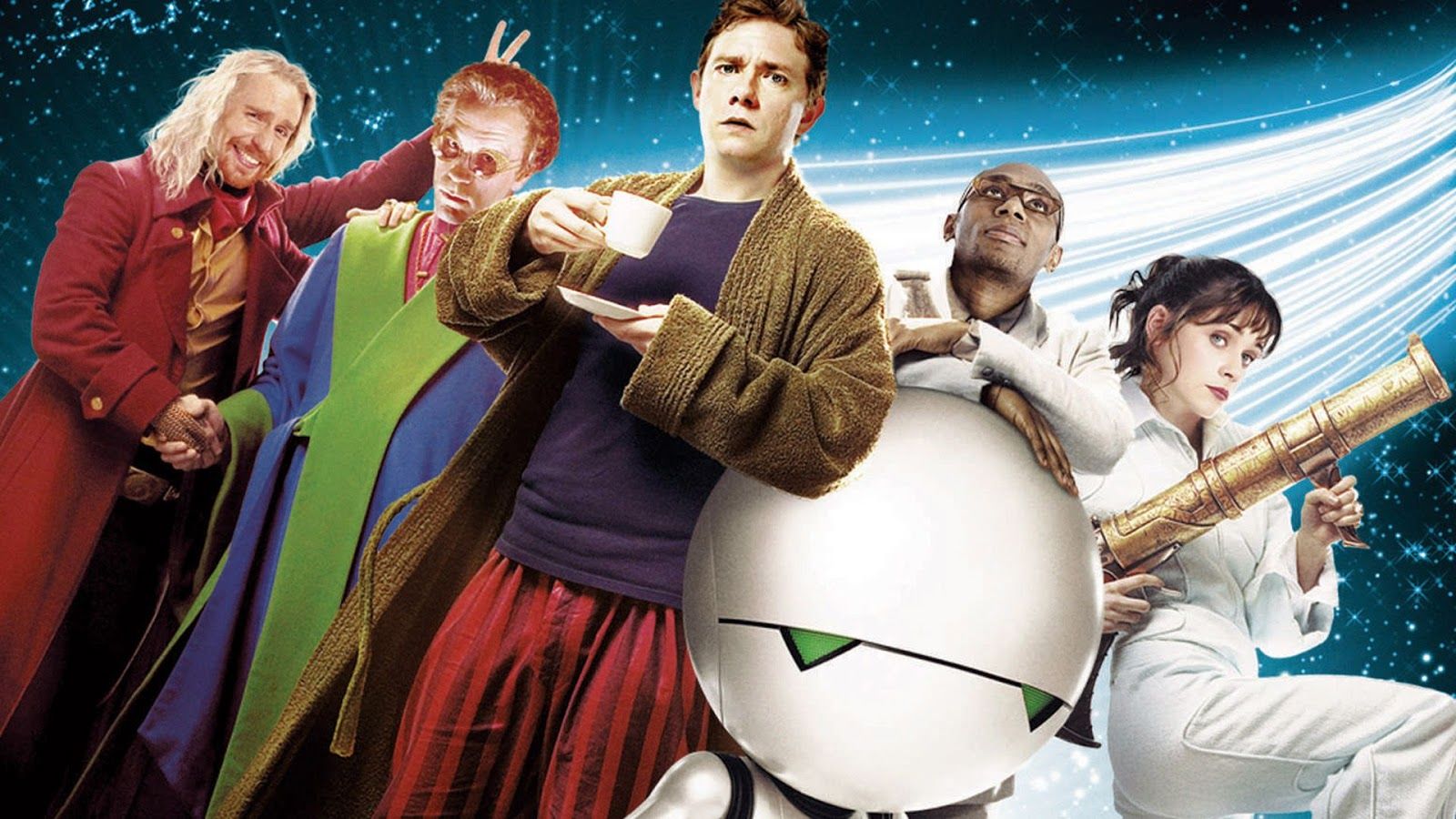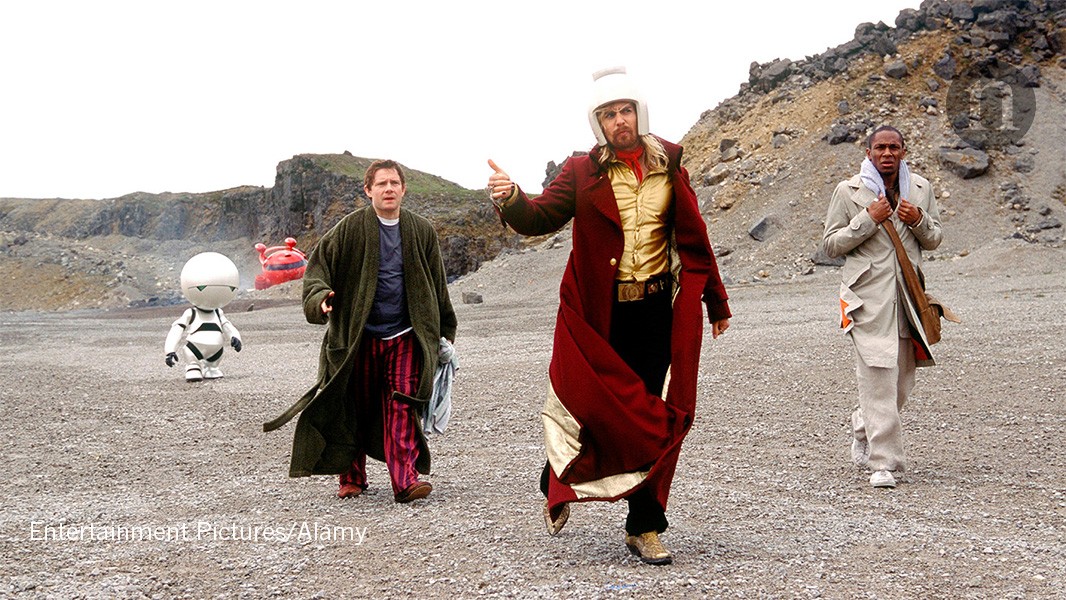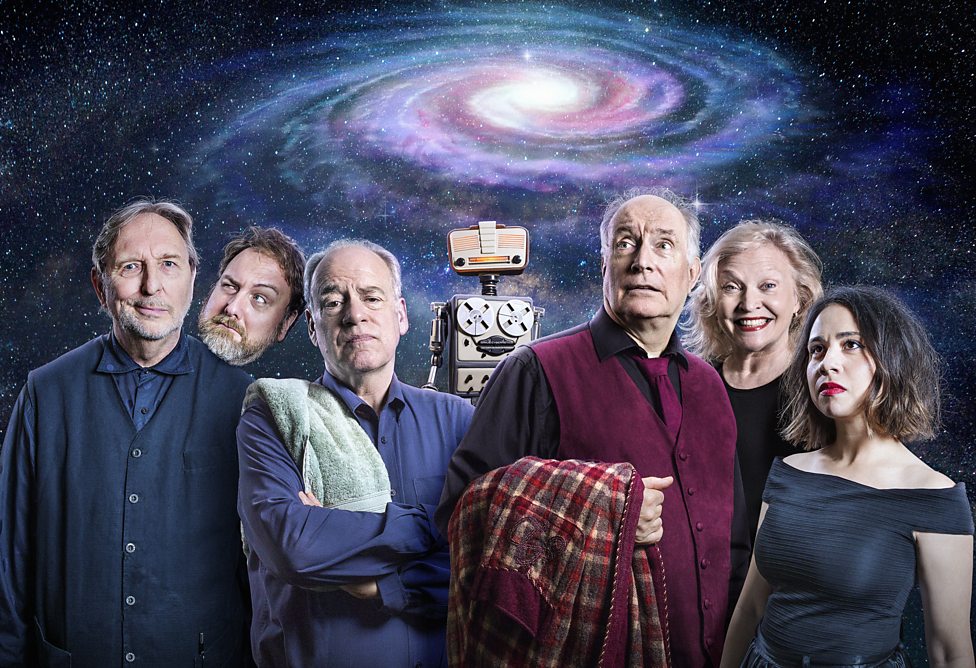
The internet is a vast, unpredictable ocean of rediscovery, and sometimes, a true gem from the past washes ashore, capturing a whole new generation’s imagination. While the notion of an ‘obscure ’90s sci-fi show’ suddenly dominating streaming platforms might conjure images of forgotten VHS tapes given a digital glow-up, the truth behind the persistent buzz around *The Hitchhiker’s Guide to the Galaxy* is far more expansive and delightfully complex. This isn’t merely a blast from the past; it’s a sprawling, multi-faceted cultural phenomenon that has captivated audiences across radio, books, television, and film for decades, and its unique blend of absurdity and profound insight makes it eternally binge-worthy.
Indeed, the exact iteration currently (or hypothetically) captivating millions on Hulu might be elusive, given its rich, convoluted history, which includes a pivotal 1981 BBC television series and even a planned — albeit currently stalled — Hulu adaptation announced in 2019. But regardless of the specific format, the core appeal remains undeniable. Douglas Adams’s creation offers a sanctuary for those who crave intelligent humor, philosophical musings dressed in slapstick, and an imaginative escape from the mundane. It’s a universe where a towel is the most important item, a supercomputer’s ultimate answer is ’42’, and the cosmos is both terrifyingly vast and hilariously bureaucratic.
So, why does *The Hitchhiker’s Guide to the Galaxy* continue to resonate so powerfully, drawing in new fans and delighting old ones, making it the perfect candidate for a deep-dive binge? It’s a testament to Adams’s genius, the sheer versatility of his storytelling, and the unforgettable world he crafted. Let’s chart a course through the key elements that make this franchise an enduring, beloved, and thoroughly binge-able journey across the known and unknown stretches of the universe.

1. **The Accidental Genesis: A Drunken Field and a Wholly Remarkable Idea**Every legendary tale has an origin story, and *The Hitchhiker’s Guide to the Galaxy* is no exception, though its beginning is as charmingly disheveled as Arthur Dent himself. Douglas Adams, the visionary behind this cosmic comedy, claimed the title and core concept sprang from a rather memorable moment in 1971. While hitchhiking around Europe as a young man, armed with a copy of the *Hitch-hiker’s Guide to Europe* book, he found himself lying drunk in a field near Innsbruck.
Looking up at the stars, a moment of profound, inebriated clarity struck: wouldn’t it be a truly excellent idea, he pondered, for someone to write a hitchhiker’s guide to the galaxy as well? This seemingly simple, whimsical thought blossomed into one of the most beloved and influential science fiction comedies of all time. It’s a testament to the power of observation, even when chemically enhanced, and a reminder that some of the best ideas can arrive when you least expect them, often with a slight wobble.
Adams, with characteristic wit, later admitted that he had told the story of this incident so many times that he had forgotten the incident itself, only knowing of it through his own repeated recounting. This anecdote perfectly encapsulates the spirit of the *Hitchhiker’s Guide* — a blend of grand ideas, self-aware humor, and a slightly unreliable narrative. It’s a delightful origin, painting a picture of a creative mind inspired by the mundane and the infinite, perfectly setting the stage for the glorious absurdities to come.

2. **A Groundbreaking Radio Sitcom: The Genesis of a Phenomenon**Before it became a literary sensation or graced the silver screen, *The Hitchhiker’s Guide to the Galaxy* was, first and foremost, a groundbreaking radio sitcom. Broadcast over two series on BBC Radio 4 between 1978 and 1980, this original format laid the foundation for the entire multimedia franchise. It all began with a proposal for “The Ends of the Earth,” a series of self-contained episodes, each ending with Earth’s destruction in a different way. However, as Adams penned the first episode, the necessity of an alien character — a roving researcher for a “wholly remarkable book” — shifted the focus entirely.
This shift transformed the concept into something much grander, with the Guide itself becoming the narrative anchor, and the destruction of Earth a mere opening gambit. Despite a rather low-key launch, with the first episode airing late on a Wednesday night, the radio series quickly garnered “generally good reviews and a tremendous audience reaction.” Its innovative approach to sound, being the first comedy series to be produced in stereo, was a particular highlight. Adams aimed for a production quality comparable to a modern rock album, dedicating a significant portion of the budget to intricate sound effects, a testament to his ambition to make radio truly cinematic.
The series was not just a hit; it was a revolution in audio storytelling. The voice of the Guide, memorably portrayed by comedy actor Peter Jones after an extensive three-month search, became an iconic narrative presence, guiding listeners through the bewildering expanse of the universe with calm, sardonic authority. The pioneering sound design, coupled with Adams’s unparalleled script, created an immersive experience that proved that radio, far from being a fading medium, could be at the forefront of innovative entertainment, forging a deep connection with its audience that continues to this day.

3. **The Unforgettable Premise: Earth’s Destruction and a Galactic Hitchhiker**At the heart of *The Hitchhiker’s Guide to the Galaxy*’s enduring appeal is its utterly captivating and utterly absurd core premise. The broad narrative kicks off with perhaps the ultimate ‘bad day’ scenario for humanity: the demolition of Earth. Our unsuspecting protagonist, Arthur Dent, a hapless Englishman, finds his home planet unceremoniously annihilated to make way for a hyperspace bypass – a bureaucratic decision made by the unpleasant, poetry-loving aliens known as Vogons.
Arthur is narrowly rescued from this cosmic demolition by his seemingly ordinary friend, Ford Prefect, who reveals himself to be an alien writer for the eponymous electronic travel guide. This immediate, jarring plunge into the absurd is what hooks so many viewers and readers. Arthur’s relatable bewilderment in the face of galactic bureaucracy and unimaginable technologies grounds the wilder aspects of the story, making his journey a surrogate for our own awe and confusion when confronted with the truly alien.
His rescue involves the quintessential act of space travel: hitchhiking onto a passing Vogon spacecraft. This narrative choice immediately establishes the series’ irreverent tone and its central theme of the small, often helpless individual navigating an indifferent, vast, and frequently ridiculous universe. It’s a comedic setup that simultaneously satirizes the banality of evil and celebrates the resilience (and sheer luck) of an ordinary man thrown into extraordinary circumstances, setting the stage for a saga that is both hilarious and surprisingly poignant.

4. **The Iconic Ensemble: Characters That Resonate Across the Cosmos**No grand cosmic adventure is complete without a cast of unforgettable characters, and *The Hitchhiker’s Guide to the Galaxy* delivers in spades. Beyond Arthur Dent, the quintessential everyman floundering through the cosmos, we meet a diverse and deeply idiosyncratic ensemble that forms the beating heart of the franchise. There’s Ford Prefect, Arthur’s alien rescuer and a researcher for the Guide, whose dry wit and encyclopedic (if sometimes unreliable) knowledge of the galaxy offer both guidance and further confusion.
Then there’s Zaphod Beeblebrox, Ford’s eccentric semi-cousin and the two-headed, three-armed President of the Galaxy, a charismatic rogue who has stolen the Heart of Gold, a spacecraft equipped with the mind-bending Infinite Improbability Drive. Zaphod is a whirlwind of self-indulgence and unexpected heroism, providing much of the series’ anarchic energy. Completing this core group is Trillian, an intelligent and resourceful astrophysicist from Earth (known as Tricia McMillan before her abduction by Zaphod), who offers a dose of grounded pragmatism amidst the madness, and often a much-needed female perspective in a largely male-dominated galaxy.
And of course, we cannot forget Marvin the Paranoid Android. Marvin, with a brain the size of a planet and a perpetually depressed disposition, is a character whose existential angst and profound misery are played for maximum comedic effect, yet he also elicits genuine sympathy. His nihilistic pronouncements and endless complaints about the pointlessness of existence are some of the most quotable lines in the entire series. Together, this motley crew forms a dysfunctional family unit, their individual quirks clashing and complementing in ways that drive the narrative forward and, more importantly, make us laugh, think, and feel a little less alone in our own cosmic confusion.

5. **The Quest for the Ultimate Question: “42” and Philosophical Wit**Beneath the layers of interstellar travel, absurd alien encounters, and witty banter, *The Hitchhiker’s Guide to the Galaxy* grapples with one of humanity’s most profound existential inquiries: the meaning of life, the universe, and everything. This grand philosophical quest is famously distilled into the enigmatic answer “42,” delivered by the supercomputer Deep Thought after eons of calculations. The revelation that the answer is “42” is, in itself, a stroke of comedic genius, perfectly embodying the series’ blend of profound contemplation and utter ridiculousness.
However, the real twist, and the true stroke of Adams’s genius, is that while we have the answer, no one actually knows the *question*. The Earth itself, we learn, was a giant supercomputer designed by Deep Thought to determine what the Ultimate Question actually is. This narrative device brilliantly satirizes humanity’s constant search for meaning, suggesting that perhaps we’ve been asking the wrong questions all along, or that the answer is meaningless without the proper context. It’s a wonderfully cynical yet ultimately liberating thought, challenging us to find meaning in the journey rather than a single, elusive destination.
The “42” phenomenon has transcended the books, becoming a widely recognized cultural shorthand for a paradoxical, unsatisfying, or profound answer to a grand question. It’s a testament to how effectively Adams injected genuinely thought-provoking ideas into his comedy. This constant interplay between the cosmic and the comedic, the profound and the utterly trivial, is a hallmark of the series and a key reason why it continues to captivate and stimulate the minds of its audience, inviting deep contemplation alongside hearty laughter.

6. **A “Trilogy in Five Parts”: The Literary Foundation**While its roots were in radio, *The Hitchhiker’s Guide to the Galaxy* truly exploded into an international multimedia phenomenon through its novel series. Described famously as “a trilogy in five parts” (and later, with the release of a sixth novel, “the increasingly inaccurately named Hitchhiker’s Trilogy”), these books became the most widely distributed format, translated into more than 30 languages by 2005. For many, the novels are considered the definitive version of the story, primarily due to their accessibility and widespread availability.
The first novel, also titled *The Hitchhiker’s Guide to the Galaxy* and published in 1979, was an immediate sensation, reaching number one on the book charts in its second week and selling over a quarter of a million copies within three months. This success was a clear indication of Adams’s ability to transcend media, translating the unique charm of his radio series into a compelling literary form. The subsequent novels — *The Restaurant at the End of the Universe* (1980), *Life, the Universe and Everything* (1982), *So Long, and Thanks for All the Fish* (1984), and *Mostly Harmless* (1992) — continued to build on this legacy, expanding the universe and delving deeper into the characters’ misadventures.
Though Adams frequently rewrote the story substantially for each new adaptation, making the plots of the television and radio series only ‘more or less the same’ as the first two novels, the books cemented the narrative in the public consciousness. They offered readers the opportunity to immerse themselves fully in Adams’s meticulously crafted universe at their own pace, savoring every witty turn of phrase and philosophical aside. The literary series remains the entry point for countless fans and a cherished cornerstone of the entire *Hitchhiker’s Guide* experience.
The journey through Douglas Adams’s wonderfully absurd universe doesn’t end with a stack of iconic novels. Oh no, dear reader, that would be far too simple, far too conventional for a saga that gleefully defies logic and gravity alike. The true genius of *The Hitchhiker’s Guide to the Galaxy* lies not just in its initial brilliance, but in its astounding adaptability, its chameleon-like ability to transcend formats and continue to captivate audiences across generations. From pioneering television to a big-screen spectacle, and from spirited radio revivals to the potential for future streaming glories, this franchise has proven itself to be a true multimedia marvel.
What makes *Hitchhiker’s* such a perennial favorite, such an endlessly binge-able delight, is precisely this elasticity—this willingness, even eagerness, to be reinterpreted, reimagined, and re-broadcast, always with Adams’s unique blend of wit and cosmic despair at its core. It’s a universe that invites exploration in every conceivable medium, a testament to a story so rich and so ridiculously entertaining that it simply cannot be contained. Let’s pick up our towels and dive headfirst into the continuing odyssey of this wholly remarkable tale, charting its course through diverse adaptations and its lasting, influential imprint on pop culture.




